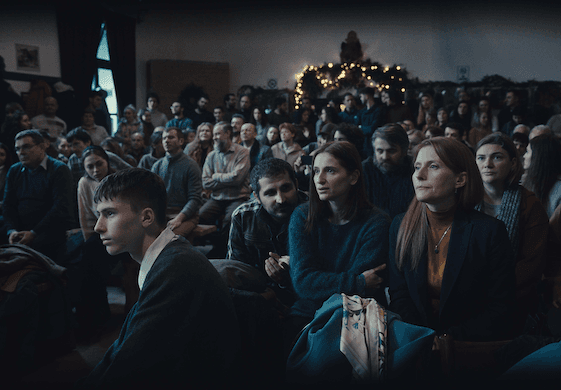Other Than Being Set in Transylvania, ‘R.M.N.’ Is as Universal as Film Gets
Like the proverbial ripple in a pond, sundry bigotries expand outward but also, in crucial ways, redound inward in writer and director Cristian Mungiu’s new film.

Toward the end of the new film from writer and director Cristian Mungiu, “R.M.N.,” there is a riveting scene that takes place in a crowded auditorium. The entirety of a small Transylvanian village seems to be in attendance. The topic of conversation is the recent arrival of three men from Sri Lanka who’ve been hired by the town bakery. The locals resent their presence for reasons that are as narrow-minded as you might fear. Then other resentments arise, many of them long-standing. How long-standing? How about 700 years or so.
Here is another outpost of our world for which the roots of history are as tangled as they are deep. In his director’s statement, Mr. Mungiu writes of “the typical kind of territory that was disputed between two countries and passed from one to another,” after which he unrolls a host of facts about the Saxons, the Austro-Hungarian empire, communist rule under Nicolae Ceaușescu, street fighting, populism, slaves, and servants. Pretty demanding content for a movie that was spurred, in a roundabout way, by “Young Frankenstein.”
Mel Brooks is all well and fine, but my guess is that Transylvania exists in the popular imagination primarily as the purview set out by Bram Stoker’s “Dracula.” “R.M.N.” is Mr. Mungiu’s attempt to flesh out a region that is significantly different and, in the end, more complex than “that place which is at the end of the world.” The issues traversed by the picture should be resonant for any polity that finds itself riven by changing demographics and a past not without its share of sins. The specifics of Transylvania notwithstanding, here’s a film that’s as universal as you can get.
The film centers on Matthias (Marin Grigoire), a gruff, rough-hewn laborer who has to abandon his job in a German butchery after he pummels the boss for slagging him off as a “lazy gypsy.” After thumbing his way back to Romania, Matthias reunites with his wife Ana (Macrina Bârlădeanu) and their son Rudi (Mark Blenyesi). The reception is frosty on Ana’s part and hesitant on Rudi’s. Ana eventually admits Matthias into the family home and soon we learn why she’s reluctant to do so: Matthias has been having an affair.
Csila (Judith State), Matthias’s lover, is cut from a different social cloth than Matthias and Ana: she plays the cello, dresses rather stylishly, is conversant with EU protocols, and is second-in-command at the village’s state-of-the-art bakery. Her boss, the formidable Mrs. Dénes (Orsolya Moldován), is a businesswoman through and through.
When no one in the village is willing to take on positions in need of filling, she hires three foreigners eager for work. Whereupon the locals, already bristling under the constraint of an economic downturn and a world in transition, begin to indulge their worst instincts. Like the proverbial ripple in a pond, sundry bigotries expand outward but also, in crucial ways, redound inward.
Mr. Mungiu hasn’t altogether sacrificed the otherworldly in his movie, though it doesn’t become apparent until the movie’s final moments, nor does its presence make or break “R.M.N.” The acronym, in case you were wondering, stands for Rezonanta Magnetica Nucleara, a procedure that determines the structure of organic compounds or, as the director defines it, “a brain scan trying to detect things below the surface.” There are less hermetic ways to go about titling a film.
“R.M.N.” is troubled by a lack of cohesion — Mr. Mungiu isn’t particularly adroit in navigating between historical generalities and narrative particulars — but is recommended for the acuity brought to bear on its many byways. If that scene in the auditorium, filmed in a 17-minute single take, doesn’t quite redeem the movie’s ungainliness, it does signal a director who is as gifted as he is ambitious. Every film should lurch along with as much surety and fervor.
Correction: Mungiu is the spelling of the last name of the director. The name was misspelled in an earlier version.

